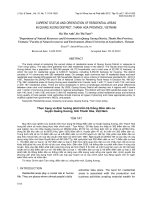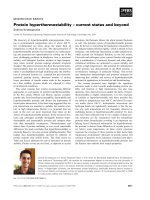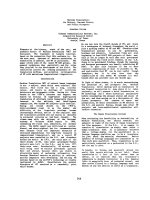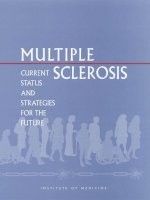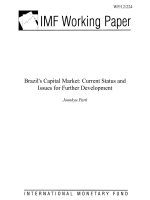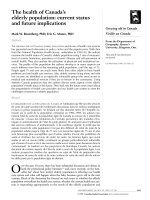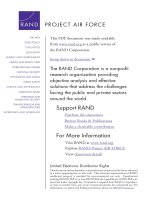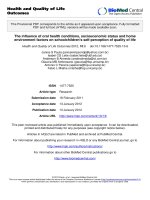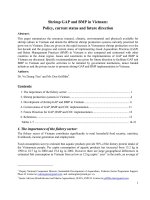Current status and training need of scientific research of postgraduate students from hanoi medical university in 2020 2021 and some related factors
Bạn đang xem bản rút gọn của tài liệu. Xem và tải ngay bản đầy đủ của tài liệu tại đây (497.27 KB, 77 trang )
MINISTRY OF EDUCATION AND TRAINING MINISTRY OF HEALTH
HANOI MEDICAL UNIVERSITY
NGUYEN THI THU HA
Training sector: Bachelor of Public Health
Industry code: D720301
THESIS OF GRADUATION BACHELOR DEGREE
Course: 2017 -2021
Supervisor
LE XƯAN HUNG. MSc
Hanoi-2021
r-u -ÍM Qỉ ugc V Hl
ACKNOWLEDGEMENTS
First of all. I would like to thank my supervisor Le Xuan Hung. MSc - Lecturer
in the Department of Biostatistics and Medical Informatics. Hanoi Medical
University for guiding and supporting me throughout. Thank you for
enthusiastically teaching and caring, believing in me. and giving me direction
when needed.
I would like to express my sincere thanks to the Department of Biostatistics and
Medical Informatics teachers for creating conditions for me to complete the
thesis in the best way.
I would also like to thank friend Nguyen Ngoc Allh. who accompanied and
supported me during this thesis
Finally. I would like to thank my family and friends who are the greatest
encouragement and positive motivation during that time.
Hanoi. May 15*. 2021
NGUYEN THI THU HA
r-u -ÍM Qỉ ugc V Hl
COMMITMENT
Respectfully addresses to:
-
Board of Training Hanoi Medical University
-
Institute for Preventive Medicine and Public Health
-
Thesis committee members.
I guarantee that this research with the title: “Current status and training
needs of scientific research of postgraduate students from Hanoi Medical
University and some related factors" is to accomplish my training program. The
data and results presented in this thesis were conducted by myself and have nor
been published on any other scientific platform.
Hanoi. May 15th, 2021
NGUYEN THI THU HA
r-u -ÍM CỊỈ ugc V Hl
LIST OF CONTENT
BACKG ROUND..........................
r-u -ÍM Qỉ ugc V Hl
r-u -ÍM CỊỈ ugc V Hl
LIST OF ABBREVIATIONS
Dr Doctor
r-u -ÍM Qỉ ugc V Hl
LLST OF TABLES
r-u -ÍM Qỉ ugc V Hl
LIST OF FIGURES
Figure 3-1: The average score building research topic skill by education level25
Figure 3-5: The average score of scientific
research skill by educationlevel 33
Figure
each
pan
3-6:
of thesis
The level
36 of supervisor's parti cipation in
-ÍM Qỉ ugc V Hl
Thực trạng kỳ năng và nhu cầu học nghicn cứu khoa học cùa học viên sau (lại
học trường đại học Y Hà Nội và một số yếu tố liên quan.
Tóm tất:
Kỳ nâng nghiên cửu là rat quan trọng đoi với tất ca học viên y khoa,
không chi đe theo đuổi sự nghiệp nghiên cửu mà còn để thực hành y học dựa trên
bằng chứng. Nghiên cứu chúng tôi dược tiền hành với mục tiêu" Mó ta thực
trạng kỳ nâng, nhu cầu dào tạo nghiên cứu khoa học cua học viên sau dại học
trường dại học Y llà Nội và một so yêu to liên quan”. Nghiên cứu mô ta cat
ngang thực hiện trên 234 dồi tượng học viên sau dại học qua thu thập mầu thuận
tiện. Kết qua cho thấy diêm kỹ lìãng nghiên cứu khoa học nhóm thạc sì*
3.45(0.5) cao hơn nhóm bác S1' nội Irủ 3.20 (0.62) và sự khác biệt này cõ ý
nghía thống kẽ. Trong khi. kỹ nâng thực hiện san phẩm khoa học có diêm trung
bỉnh cao nhất ớ cá hai nhóm thí kỳ năng phân tích dữ liệu và sư dụng cơng cụ
phân tích có diêm trung bính thấp nhất. về nhu cầu đảo tạo-, thống kê lã nội dung
đào tạo những học viên mong muốn được học tâng thêm. -Mức độ tham gia cua
giáng viên vào đề tài cuối khóa và kinh phí thực hiện nghiên cửu lã nhùng yếu tố
có mối lien quan (p<0.05) đến kỳ năng nghiên cứu khoa học cúa dối tượng.
Chúng tỏi khuyến nghị tảng cường bãi học VC thống kê trong môn nghiên cứu
khoa học. Đồng thời cần hồ trợ nhùng dối tượng hục viên tham gia vào những dự
án nghiên cứu dược tài trợ kinh phí và giáng viên dành nhiêu thời gian tham gia
vảo khóa luận cùa học viên.
Từ khóa:
A.V yểu
nâng,
cửu khoa học. sau dại học. nhu
cầu
dào tạo,
tổnghiên
liên quan.
-c -ÍM CỊỈ ugc V Hl
C urrent status and training needs of scientific research of postgraduate students
from Hanoi Medical University and some related factors.
Abstract:
Research skills are crucial for all medical students, not only to pursue a
career ill research but also to practice evidence-based medicine. Our study was
conducted with the objective of "Describing current status and training needs of
scientific research of postgraduate students from Hanoi Medical University in
2020-2021. and some related factors". A cross-sectional study was carried out on
234 post-graduate students through convenient sample collection. Results show
the average score of research skills of the master students 3.45 (0.5) is higher
than that of the resident doctors 3.20 (0.62) and this difference is statistically
significant. Scientific product implementation skills have the highest average
scores in both groups, an average score of “data analysis and analysis tools" skill
is the lowest. Regarding training needs, statistics skill was the content of training
which students want to learn more. The participation of supervisors and the cost
of conducting the research are the factors that are related to die scientific research
skills with statistically significant (p<0.05). We recommend that students have
more statistics on statistics., participate in funded research projects, and
supervisors spend more time orienting students on thesis writing.
Keywords:
needs,
related
Skills,
factors.
scientific research, graduate, training
BACKGROUND
The scale of graduate training in Vietnam has grown rapidly in recent years 1.
Many medical schools in Vietnam and worldwide have regulated the output
standards for graduate students, such as scientific research products including
theses, scientific articles, references, research papers, and participants in
scientific conferences, seminars, etc *5 '. The research skills of graduates should
reflect in the quality of their thesis5.
-c -ÍM Qỉ ugc V Hl
Now adays, scientific research lias become an essential and necessary skill for
postgraduate students in general and especially doctors in particular
68
. Research
competence is essential for all medical students, not only to pursue a career in
research but also to practice exidence-based medicine. Furthermore, postgraduate student research is a vital source for scientific publications, especially
for medical students 9. However, studies in the world and Vietnam also showed
that the scientific research skills of medical students were still relatively low. as
well as limitations ill both research questions and statistical skills or complete
scientific products :0 ■
A report in Treatment Science Research found that a lack of scientific
research capacity, especially among graduate students, is one of the main factors
leading to inferior quality research products, waste, and difficulty in publishing
research results n. In addition, many studies also show’ the need to learn different
scientific research skills of medical students such as the desire to improve
statistics skills. writing scientific articles, etc; Being flexible teaching methods
such as research-oriented teaching, group training However, those studies have
not specifically reflected the ability of students in each specific scientific research
skill.
Hanoi Medical University lias been increasingly demanding the output quality
of students’ research ability, and aiming to build the university into a research
university. The quantity and quality of research play an important role. Therefore,
it is necessary to research the research skills of graduate students based on
objective self-assessment from research subjects. For the above reasons, we
conducted a study on "The current status and training needs of postgraduate
students of Hanoi Medical University and some related factors" with two
objectives:
1. Describing Hanoi Medical University postgraduate student's current
-c -ÍM Qỉ ugc V Hl
situation and scientific research needs.
Analyzing related
postgraduate
students
factors
of Hanoi
to the
Medical
research
University.
status of
-c -ÍM Qỉ ugc V Hl
1
3
CHAPTER 1: OVERMEW
1.1 Some related definitions
1.1.1
Scientific research
Scientific research is the activity of seeking, examining. investigating, or
experimenting. Based on data, documents and knowledge obtained from natural
and social experiments. It is done to create new higher valuable technical
methods and means. People who want to do scientific research must have certain
knowledge about the research field and more importantly, they need to practice
self-reliance and methodical work from the time they are at school15.
1.12 Scientific research capacity
In terms of research capacity, according to A. ẳeberová. it is an open and
constantly evolving system, which includes both declared and procedural
knowledge in the field of research, attitudes, and readiness of individuals that
allowed researchers to research within the framework of their professional
activities (ZOOS. p.61). In general, like all other competencies, scientific
research capacity includes three main components: knowledge, skills, and
attitudes:J:
Knowledge: includes specialized knowledge: knowledge of scientific
research methods
Skills: skills
collection
skills:
to scientific
develop
skills
research
in
data analysis
topics:
research
and
use skills;
of
data
analytical
scientific
tools:
reasoning
skills;
critical
Scientific
and
report
critical
writing
skills
Altitude: enthusiastic, passionate about science; sensitive to liappening
events (scientific phenomena): objective, honest, serious; persistent, careful
when working: the spirit of cooperation, sharing products :i.
1.13 Output standard
Output standards are the minimum requirements for knowledge, skills,
altitudes, and professional responsibilities that learners achieve after completing
a training program, committed by the training institution to learners, society, and
-■c -ÍM Qỉ ugc V Hl
1
4
publicly announced together with the conditions to ensure performance :6.
1.1.3. J Thesis/dissertation
Master's thesis and doctoral thesis are documents describing the research
process of postgraduate students. A scientific thesis is a monograph on a
scientific or technological problem Witten by one person for the purpose 17 15.
Training in scientific research methods and skills;
+ Experimenting with the results of a learning period or a scientific problem of
interest:
+ Publicly defending before the Board or being graded to get a uni versin'
diploma or a master's or doctoral degree.
The main purpose of the thesis is learning and reflecting the learning
results. Besides, it is a scientific research work, showing the serious and
independent scientific labors, discoveries as well as creativity and scientific
ideas of the writer. The thesis is a scientific work, so it requires serious
implementation and must meet the requirements: the thesis must have scientific
and practical significance; figures and sources cited must be accurate and
reliable; writing style must be coherent and precise; the thesis is correctly
presented according to the set criteria and illustrates that the writer has research
methods.
Doctoral theses demonstrate technical proficiency in the student’s field
and enhance or modify existing knowledge. The thesis should process new
material, find new results or draw new conclusions: or it will interpret the results
in a new way.
1.1.3.1
Scientific research topics at ali levels
The scientific research topic is posed due to the requirements of theory or
-■c -ÍM Qỉ ugc V Hl
1
5
practice and satisfies the following conditions: the scientific problem contains
the contradiction between the know and the unknown, and it is be able to resolve
that conflict.
1.1.3.2
Scientific articles
Articles are fully written and fully published original results in scientific
journals in the prescribed format1S.
1.1.3.3
Presentation at a conference on scientific research
Summary of research results according to the conference request form
1.1.1 Scientific research training methods
Forms of training in scientific research
There are
research
for
many
graduate
diverse
trainingsuch
programs
asboth
intensive
inmethods.
scientific
training,
online
training,
and astudents
combination
of
Centralized training: Centralized training takes the form of traditional
training in the form of face-to-face meetings between students in classes, groups,
and lecturers. Most research training courses for postgraduate medical students
will be integrated into regular training master's programs, specialty and
doctorate 1?. In addition, there are structured short courses or seminars with clear
objectives to improve the research capacity of the students
20
and group
discussions among medical students have also been conducted " or training
programs that specialize in in-depth research on a specific skill, a specific field
to improve students' competence 2J.
Online training: Nowadays, there are some other training programs such
as online study courses: learning via the online platform; Lessons are taught
according to available lectures and questions are answered online and group
discussions among medical students are also conducted.
Combining online and concentrated training: E-leaming is being used
more and more widely. Hanoi Medical University is also implementing an E-
-■c -ÍM Qỉ ugc V Hl
1
6
leaming program for some subjects. Students will leant lessons prepared by the
subject in advance according to a specific class schedule. Students' questions
will be answered in two ways: online and offline focused on the lecture hall in
practice sessions and answering questions.
Evaluationform
Regarding the form of assessment of graduate students, it is the knowledge
tests and dissertations for the master's degree, and theses or scientific products
towaids the doctor degree. There are some evaluation forms such as Group
outline product. Individual research idea, Evaluation of knowledge in the
learning process, Defense of individual outline/idea at the end of the course.
Theory test at the end of the course.
1.2 General situation of scientific research ỉn the world and Vietnam
According to a statistical report on the thesis of a medical doctorate in
some countries from 2009-2013 such as Romania 425 theses and 1021 articles;
French 69 thesis and 159 related articles. UK 63 thesis and 80 related articles.
But the quality of articles in the UK and France is considered to be of better
quality and the rate of international export is higher 24. Another study conducted
in Latin America showed that the countries in this region are also not well
established in terms of scientific research, however, the number of scientists and
the organization of research projects have increased in recent years .
;6
r
In Vietnam
Asia
from
1996
Research
to
2005.
on
scientifi
and
the
citation
cof
products
index
in
Southeast
of
scientific
published
3456
publications
scientific
in
research
2000-2001
works
show
during
that
Vietnam
19962005
ranks
period,
among
the
lowest
this
number
in
the
of
country.
scientific
However,
publications
the
quality
higher
than
of
scientific
that
of
other
publications
countties
in
in
Vietnam
the
region,
is
somewhat
with
the
being
average
9.74
times.
number
The
of
citations
quality
of
per
Vietnamese
article
within
scientific
5
years
products
colleagues
is
mainly
.and
Another
thanks
study
to
evaluating
the
cooperation
the
status
with
foreign
of
international
2000-2018
from
scientific
the
Web
of
publications
Science
database
had
in
showed
Vietnam
that
31.966
Vietnamese
international
authors
for
scientific
the
period
publications
2000-2018.
have
In
the
that
field
of
of
natural
medical
sciences
science
(20.8%)
and
science
this
and
rate
technology
is
lower
than
.for
1.3 Essential research skills
To earn' out a scientific research product, researchers need to have many
different skills. Among them, there are skills of particular importance u:
1.3J Budding research topic skills:
Building research topic skills is an extremely important skill, as it
determines the success or failure of the research. Topic-building skills include
-■c -ÍM Qỉ ugc V Hl
1
7
prioritizing problem selection skills, research objectives, problem sets, document
review.
1.32 Research design skills
The design of a research project must correspond to the research objective
of the topic, the type of data to be collected, the variable indexes, sample
selection, research design, analytical methods, etc.
1.3 J Skills to collect data for the research topic
Data collection is a very' important stage, so the researcher must have the
skills to organize data collection to ensure scientific objectivity.
1.3.1
Data analysis and use of analytical tools skill
Data analy sis aims to highlight the characteristics, cliaracteristics. and
properties of the research object (descriptive research) or to help the researcher
test the hypothesis (explanatory research). The researcher must know how to use
a variety of analytical software.
1.3.2
scien tiflc reason mg skill
Scientific research is based on persuasion by arguments and proofs.
Arguments must be based on science that the scientific community lias
recognized. More than that, critical skills help find the research findings and the
weaknesses of the research that need to be overcome.
1.3.3
Writing scientific articles skill (reports)
A research project must end with a scientific paper or report. The article’s
presentation requires the researcher to have information skills, write what needs
to be written, accurately express the nature of tlie matter so that all readers can
understand the same. At the same time, proficiency in foreign lai^uages.
especially English, is necessary in the world of scientific integration.
-■c -ÍM Qỉ ugc V Hl
1
8
1.4 How to calculate points for research skills
Scientific research skills will have characteristics for each skill. The scores
of each characteristic in the skills are divided on a 5-point Likert scale, which is
referenced from research articles worldwide on the current state of scientific
research capacity of medical students5.
The variables related to research skills are coded according to the 5-level
Likert scale:
5 points: Research subjects evaluate research skills “Very good”
4 points: Research subjects evaluate research skills “Good"
3 points: Research subjects evaluate research skills “Neutral**
2 points: Research subjects evaluate research skills “Not good"
I point: Research subjects evaluate research skills "Very bad”
The score for each science skill is calculated as the average of all the features of
that skill. The general science skill score is the average of all science skills.
1.5 Some factors related to students’ research skills
1.5.1
Demographics
1.5.1.1
Age and gender
There was a difference in research product publication as well as the
output quality of male medical students higher than that of women. Because men
have more time to research than women 's. Young people rarely participate in
research because of the overload of research time that was not suitable for the
current job classification
29
50
. However, their many studies showed no
relationship between age. seniority, time, and work to research capacity 51.
1.5.1.2
Education level
-■c -ÍM Qỉ ugc V Hl
1
9
Higher degrees have better research and support skills, and those who
achieve the liighest levels of education have more confidence and responsibility
for research participation52
1.5J Conditions for research practice
1.5.2.1
The influence of lecturers
Some studies have shown that the involvement of lecturers in supervision
and guidance, such as insufficient time allocation or inadequate problem solving,
affects the research capacity of the students leading to the lack of skills to
conduct high-quality research J4.
1.5.2.2
Funding- Facilities
The lack of
inadequate
research students
funding
lead toor
a lack
financial
of motivation
support, to
and
research
byfacilities
doctoral
1.5.2.3
Current knowledge and learning materials
Knowledge aiid skills acquired from existing practitioners, and the lack of
access and limited materials are major barriers to pursuing research 55 •*.
1.5.2.4
Duration and course of study
The time and program of study or other work have a negative influence
on the skills in intensive research of tile postgraduate 29 r. On the other hand, the
lack of clearly standardized and supervised research courses for graduate
students also impacts research ability'
1.5.2.5
Foreign languages
The difficulty in foreign language barriers, especially English, when
conducting international articles was a significant challenge for graduate
students, especially doctoral students 5S 59
1.6 Research in the world and Vietnam on scientific research
1.6.1
Research in the world
1.6.1.1
Current status of research skills in the world
-■c -ÍM Qỉ ugc V Hl
2
0
A study of 455 graduate medical students in Bavaria-Germany found tliat
the research content of the medical curriculum is quite low (2.62/5 points) and
the research capacity is average (2.88/5 points) as well as not confident enough
to conduct research independently after obtaining a doctorate: it is considered
that they' often lack skills to build methods and write scientific products
independently 19
Another study assessing the thesis research capacity of medical school
graduates in Ecuador found a weakness in research capacity from data analysis
skills (59%). scientific criticism (65%). and research techniques (61%)
In addition, the Science Publishing Department at the University of Texas
Anderson Cancer Center found that both interns and mentors were frustrated
with the lack of scientific writing skills, especially for articles in scientific
literature English. Postgraduate students believe that there were barriers to the
publication of results due to a lack of English skills "J.
On the other hand, research capacity was scarcer in low- and middleincome countries, especially in Asian countries. A study of 35 medical doctors in
India, China, Oman, and Vietnam found that research training capacity at survey
facilities was low. especially in health research .
1.6.Ỉ.2 Demand for scientific research in the world
Research in Nursing in Southeast Asia in 2017 shown that most students
were satisfied with the training program and teaching quality’. 75.5% and 74.8%
respectively; quantitative and qualitative research methods were the most
popular required and elective subjects. 88.3% of students were satisfied with the
supervision they receive from their supervisor, however. 79% reported that their
supervisor 'pushes’ them to publish research papers. For the doctoral training
program, 75.5% are satisfied with the training program; but about half reported
that the components of instructional training (55.9%) and mobility opportunities
-■c -ÍM Qỉ ugc V Hl
2
1
(54.2%) were not included in their program -,4.
The 100and
participated
postgraduate
the
2012
medical
study’
students
found
in
that
India
76%writing
whoGraduate
agreed
research
However,
training
only
50%
should
of
the
be
students
compulsory
participated
for
students.
in
the that
study,
students
want
4%in
have
to
be
published
trained
in
scientific
statistics
articles.
and
scientific
articles
Another study of medical students in Switzerland in 2017 indicated that
89% plan to continue a research-oriented career. Nearly all participants found
graduate training to be useful for their careers. The medical graduates surveyed
were satisfied with their research training and most of them went on to researchoriented careers s.
1.62 Research in Vietnam
1.6.2.1
Current status of research skills in Vietnam
A study at die University of Medicine and Pharmacy in Ho Chi Minh City
on post-graduate training showed that only 34% of respondents reported that
they did not understand the variability, confounding, and interpretation of the
variables. 20% of respondents could not explain 95% confidence intervals and pvalue; only 37% of respondents could distinguish between correlation and
regression; The number of people who can use the document search engine and
statistical software was 54%; 51% English skills were assessed as lacking
confidence. Furthermore, only 43% of respondents could describe the study
quantitatively and qualitatively. Also, the graduate interns’ previous research
including a short paper, an abstract, and presentation slides in English did not
follow a standard research paper style, and the purpose and unclear research
methods; four interviewees with research experience described difficulties in
analyzing data obtained from statistical packages and all interviewees
emphasized that they wanted to learn practical skills'.
Another study on medical students in Ho Chi Minh City indicated that
they were weak in biostatistics skills: (20%) respondents could not inteipret 95%
confidence intervals and p-values and only (43%) respondents were able to
describe quantitative and qualitative research after completing the course 1:.
A Study on the graduation thesis of graduate students and resident doctors
-■c -ÍM Qỉ ugc V Hl
2
2
of Hanoi Medical University in 2009-2011-2013-2015 on the application of
statistical competence showed that graduate students and resident doctors did not
have or had little experience in scientific research (74.4%). no or very little
ability to interpret descriptive statistics (82.1%). no or very little ability
interpretation of inferential statistical results (85.4%)4:.
1.6.2.2
Demand for scientific research training in Vietnam
34% of the research subjects at the University of Medicine in Ho Chi
Minh Ci ty felt that the research pregram at the university was not enough and
inappropriate, it is necessary to improve teaching methods more flexible: At the
same time, the obstacle to doctoral research was due to the mentoring capacity
of the instructor and the scientific literature on health .
A study at the University of Medicine and Pharmacy in Ho Chi Minh City
showed that the highest demand for training was in biomedical statistics (94%).
epidemiology (80%). and journalistic skills (77%); as well as the desire to- be
trained in computer skills and English
4
Research
residents
on
of
graduation
Hanoi
theses
University
of
graduate
in
2009-2011-2013students
and
2015
62.7%.
showed
According
students
toMedical
statistics
need
to
learn
in50.6%
the
more
subject
about
the
content
on
Scientific
outline
Research
and
report
Methodology.
before
going
to
the
want
council
toof
get
'.
advice
-■c -ÍM Qỉ ugc V Hl
23
CHAPTER 2:
RESEARCH PARTICIPANTS AND -MET HODS
2.1 Research participants
The study was conducted on subjects who liad completed one of the
postgraduate training programs at Hanoi Medical University.
Inclusion criteria:
• Graduated from the medical doctor training system
• Studied postgraduate program at Hanoi Medical University (resident
doctors and tnasters)
• Completed theses, dissertations or participated in research
Exclusion criteria:
• Subjects were exempt from scie ntific research courses
2.2 Research location and period
2.2.1
Research location
Hanoi Medical University
2.2J Research period
From October 2020 to May 2021
Data collection period: January 2021
2.3 Research Methods
2.4 Research design
Cross-sectional
2.4.1
Sample size
Tile sample
estimates
a mean
was calculated using the formula that
-■c -ÍM Qỉ ugc V Hl
ló
, s2
n z
" ’-a/2(àr
Inside:
Zj.*^: the expected accuracy of the study is 95% = 1.96;
s: standard deviation of the total research skills from the study in Germany
(s=1.08);
x: mean value of the total research skills from the research in Germany (x =
2.88)19
E:
acceptable relative error (s = 0.05).
->The minimum sample size calculated by the formula is 219. An additional
10% of the sample was reserved if the research subject reftised to answer the
questionnaire, and the answer sheet was invalid. The final sample size was 234
people.
2.43 Sampling method
Convenience sampling
2.43 Research process
To describe skills and survey students' academic research needs after graduation,
we follow the following steps:
1. Research subjects were invited to participate in the stud)' and clearly
explained the research purpose via email before data collection.
Subjects
an
online
who
questionnaire
agreed
to
participate
via
email.
innot
It
the
was
study
then
were
sent
the
three
first
days
time
if
the
after
study
the
subjects
questionnaire
had
was
responded
sentrepeated
out
and
after
a
second
time
after
seven
days.
2. The responses are sent to the management study team.
2.4.4
Collection methods and tools
The set of questions is built based on parts of the thesis and the
standards that require the students’ scientific research skills. The toolkit
consists of 5 parts: Demographic variables: scientific research skills: the need
for training and scientific research; the relevant factor variables include (Level
of participation of lecturers according to each part of the graduation thesis and
some other factors). The toolkit was built on Kobotoolbox and Google form
r-u -ÍM Qỉ ugc V Hl
software.
Once completed, the toolkit was sent online to study subjects via email.
2.5 Research variables and indicators
a. Objective 1: Group of variables related to the description of scientific
research skills and training needs of scientific research subjects.
The group of variables on scientific research skills includes: 32 variables of 6
research skills (Appendix 1).
The variable "Mean score of research skills" was equal to the average
score of 32 variables on scientific research skills mentioned above.
r-u -ÍM Qỉ ugc V Hl
